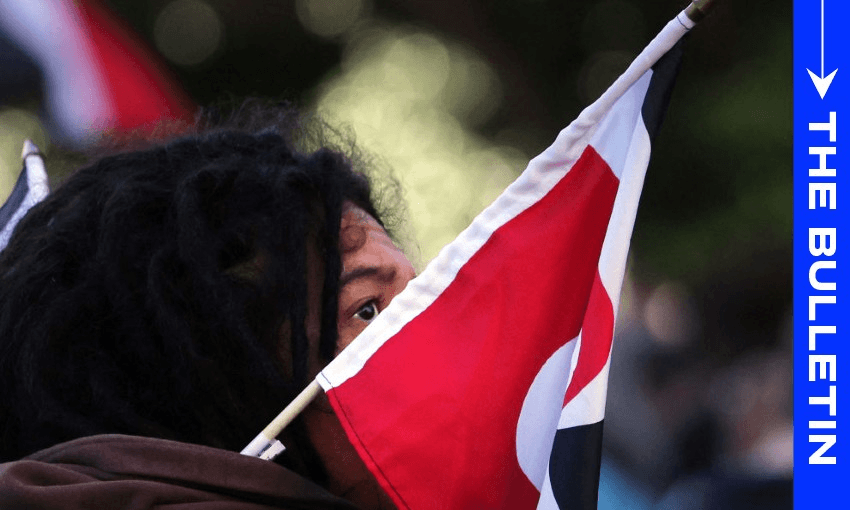The controversial proposed legislation has been introduced to parliament just a week out from its first reading, writes Stewart Sowman-Lund in today’s extract from The Bulletin.
To receive The Bulletin in full each weekday, sign up here.
Few surprises
David Seymour’s controversial Treaty Principles Bill has finally been made public – and we’ve had our first glimpse at the protest action that awaits it. The draft of the legislation was introduced to parliament yesterday, reported RNZ’s Russell Palmer, confirming minor changes to what had initially been announced. The second principle, explained the bill’s architect David Seymour, has been narrowed “to provide that the rights of hapū and iwi differ from the rights everyone has a reasonable expectation to enjoy only when those rights are agreed to as part of a Treaty settlement”. Seymour said this had occurred because the previous wording was “too broad”.
The Waitangi Tribunal released the second part of its interim report into the bill earlier this week, in time for the bill’s tabling at parliament, saying that should it pass it would “be the worst, most comprehensive breach of the Te Tiriti in modern times”. As has been widely established, the bill will be backed by all three coalition parties through first reading – set down for next Thursday – and enjoy the standard select committee period. That’s despite the fact National has pledged not to endorse the bill any further, effectively killing it sometime in early 2025.
Challenges in the House…
While the bill has now been introduced to parliament, that’s all that has happened so far. Simeon Brown, the acting leader of the house, told TVNZ’s Breakfast it was a “technicality” that would allow the public to have a first look at the bill. The real fireworks will begin when parliament has the opportunity to debate it. Nevertheless, Te Pāti Māori attempted to raise the matter at the start of question time yesterday, reported the Herald’s Julia Gabel. Multiple attempts by the party to raise points of order on the bill were shut down, but not before those in the public gallery audibly objected. Iwi leader Helmut Modlik – who recently went toe to toe with Seymour in a debate on the bill – and six other senior members of Ngāti Toa walked out of the public gallery.
In question time the day prior, as noted here in the Hansard, Green Party MP Teanau Tuiono challenged the prime minister on why the bill was being put through a full select committee process only for it to be ditched at the end. Christopher Luxon responded: “[It] is a chance for the public to engage with the process”. Unfortunately for the government, and the prime minister in particular, it means next year’s Waitangi Day will be very uncomfortable.
…And outside
There wasn’t just discontent within parliament, but outside it. A number of protesters also gathered on parliament’s forecourt in opposition of the bill, while others marched through David Seymour’s Epsom electorate, reported RNZ’s Te Manu Korihi. One protester claimed that the introduction of the bill this week was out of fear from a forthcoming hīkoi set to leave the tip of the North Island next week and weave its way down to Wellington, though Seymour, speaking to The Platform, dismissed this.
Initially intended to coincide with the treaty bill’s launch, the hīkoi will now serve as a response to the first reading. Organisers told Te Karere that the protest wasn’t against the bill, but “for Te Tiriti”. In an interesting feature this morning, RNZ’s Ella Stewart goes inside the movement – Toitū te Tiriti – pushing for protest against the coalition government. The group has been responsible for several large scale rallies across the country over the past 12 months, and has organised next week’s hīkoi as well. Spokesperson Eru Kapa-Kingi said: “As soon as this coalition government came in it sparked a fire in me and also in the people that I spend a lot of time with, particularly discussing our rights and our liberation as a people.”
‘Plenty in the pipeline’
All three opposition parties released a joint open letter in a last ditch appeal to the prime minister to scrap the bill entirely. As noted by Marc Daalder, writing for Newsroom Pro (paywalled), it’s relatively rare for parties to join together and shows the opposition wants the Treaty Principles Bill to be an issue “above politics”. That message is unlikely to be heeded by the government.
Though the government’s commitment remains only to support the bill to first reading, Seymour and Act appear equally as dedicated to trying to take it further. In an email sent to party supporters yesterday, Seymour said they would soon hear more about Act’s planned campaign in support of the bill. “Needless to say, there’s plenty in the pipeline,” he added.
Newsroom’s Fox Meyer reported that Seymour’s plan appears to be to normalise the idea of the bill, with the Act leader himself admitting it can take multiple attempts for something to progress through parliament. Matthew Hooton, writing for the Herald, said as much in a piece earlier this year. By securing a select committee process, there are months in which the public will have a chance to have their say. Should that response fall even somewhat in favour of the bill, then Seymour will have political capital with which to campaign on in 2026. “Act candidates would travel the country holding up copies of the defeated bill,” wrote Hooton. By introducing the bill, even if it is destined to fail, he has opened a conversation he believes worth having – even if it goes nowhere in this term of parliament.
On the flipside, argued Liam Rātana for The Spinoff earlier this year, it could backfire. “Far from solidifying its political standing, the party risks alienating mainstream voters and shifting towards the political fringes, tainted by divisive, hard-right rhetoric,” he wrote.
